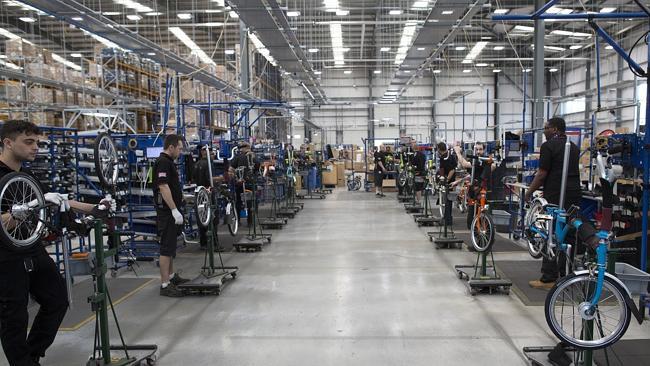Winners and losers from volatile pound after Brexit
Companies with heavy British exposure face big currency jolts after Britain’s vote to leave the European Union.

Companies worldwide are trying to predict fallout from Britain’s vote to leave the European Union but for many with heavy British exposure, one impact is already clear: big currency jolts.
The pound’s sharp fall against major currencies since the June 23 referendum has hurt some firms and benefited others.
British importers of products ranging from cars to pharmaceuticals are heavily exposed, while British exporters like folding-bike maker Brompton Bicycle are smiling. Foreign companies that book profits in Britain foresee pain, while British companies with overseas units, like defence contractor BAE Systems, should get a lift.
German rail operator Deutsche Bahn runs British bus lines and almost one-quarter of the country’s rail franchises. When the pound was strong last year, Deutsche Bahn reported a revenue boost of €373 million ($554m). Now those gains are being reversed.
In December, its DB Arriva UK subsidiary won a nine-year rail franchise that it valued at more than €10 billion. Today the contract is about €8.5bn due to the falling pound.
Deutsche Bahn’s British operations contribute roughly 10 per cent of gross profit, estimates Josef Pospisil, head analyst at Fitch Rating’s European transportation team in London.
“So it is important,” he said, noting Deutsche Bahn’s currency hedges probably cover only part of the swing.
A Deutsche Bahn spokesman said the company was closely monitoring and evaluating the situation.
The spokesman said the referendum result could also hurt consumer confidence.
Lower consumer confidence could depress demand.
Economic downturn in Britain would squeeze commercial activity for almost all firms. Even if the British economy holds up, uncertainty about Britain’s place in the world economy portends currency jitters.
Ulrich Hoppe, director general of the German-British Chamber of Industry and Commerce in London, noted that the pound has swung between about €1.10 and €1.40 over the past five years.
While he didn’t expect that range to change significantly, “we do expect volatility to increase”, he said.
Multinational corporations generally hedge currency exposure, which blunts the impact of such swings. Foreign companies that generate significant revenue in Britain, including Spanish engineering and construction firm Ferrovial and German sportswear maker Adidas, said they had hedges in place.
Smaller firms are more exposed. Britain accounts for almost one-third of Portuguese Port wine producer Taylor’s Port’s €70m annual sales and the 324-year-old house is now assessing its investment plans.
“If the pound keeps falling, we may have to consider price increases,” said chief executive Adrian Bridge, a British citizen who has lived in Portugal since 1994. Britain is also one of the largest export markets for Italian winemaker Lunelli Group, which fears price increases could hurt Prosecco sales that had recently been growing roughly 30 per cent annually.
“I’m very worried,” said chairman and chief executive Matteo Lunelli.
“It was a very promising market for us.”
Elumeo, a Berlin-based online jewellery retailer that works its gemstone in Thailand, blamed a cut in its financial guidance for the year on the Brexit vote.
The weaker pound increases costs for Elumeo’s British unit, Rocks & Co, which accounts for almost 20 per cent of group sales.
“This is having a direct impact on our gross profit margin,” a spokesman said.
Some firms see an upside in the currency swing, particularly those that manufacture in Britain.
For Bombardier of Canada, which builds trains and aeroplanes in Britain, each one-cent change in the US dollar against the pound affects costs at its aviation business by roughly $US4m before hedging, and $US1m after hedging, a spokesman said.
Late Friday, the pound had fallen by nearly US15c since the Brexit vote, cutting millions of dollars from Bombardier’s costs.
British weapons maker BAE Systems could see a 2 per cent boost to earnings-per-share from the decline in sterling, analysts said, because the company repatriated earnings from its large US operation back into Britain and each dollar now bought more pence.
Rolls-Royce, the maker of aeroplane engines, should see a similar earnings lift. A one-cent shift in the US dollar-pound exchange rate generally has a $US2m impact on profit, the company has said.
The sliding pound will also help small British exporters, though some may face higher input costs.
Brompton Bicycle exported 80 per cent of the 45,000 folding bikes it produced at its London factory last year.
“The falling pound creates opportunities to boost our sales, especially in markets with strong local currencies,” said spokesman Nick Charlier. He said imported raw materials were now pricier but “the falling pound is a good thing and we will take a fresh look at our pricing strategy in the next couple of weeks”. London-based Gina Shoes, which sells handmade shoes that average about £750 a pair, had gained in both British sales and exports to its stores in the Middle East, said director Aydin Kurdash. “The low pound is an advantage to us,” he said.
Even some small foreign firms are reaping gains. SchuF Armaturen, a private German maker of vents and valves with factories around Europe and the US, produces components at its plant in Devon, England.
“Right now, we benefit from the cheap pound,” said president Martin Frank.
Any eventual imposition of tariffs between Britain, or reinstatement of limits on labour mobility, would hurt business, he said. “We invested a lot in the UK over the past years,” he said, adding of Brexit, “In the long run it’s not a good thing.”
In crisis-hit Greece, clothing importer Sotris can now buy more goods from British suppliers. “If the pound keeps falling, we expect a jump in sales, especially in lower-end products,” said sales executive Suzi Kalimitraki.



To join the conversation, please log in. Don't have an account? Register
Join the conversation, you are commenting as Logout